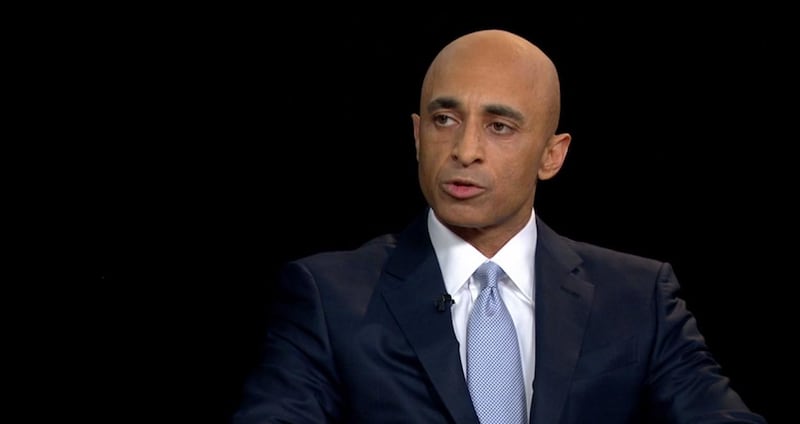The Gulf crisis is about a fundamental clash of visions over the future of the Middle East, the UAE’s ambassador to Washington said.
“Our disagreement is about what the future of the Middle East should look like and that’s something we haven’t been able to square with the Qataris for a long time,” Yousef Al Otaiba said in a lengthy and detailed interview on the Charlie Rose current affairs show on America's PBS channel.
“What we would like to see is more secular, stable, prosperous, empowered, strong governments,” Mr Al Otaiba said. “What we’ve seen Qatar do for the past 10 to 15 years is support groups like the Muslim Brotherhood, Hamas, Taliban, Islamist militias in Syria, Islamist militias in Libya — exactly the opposite direction we think our region needs to go.”
The ambassador said that Donald Trump’s summit in Riyadh in May, which many observers say helped trigger the crisis because of his apparent support for the Saudi and Emirati stance on Qatar, was not the cause of the crisis.
“This is like a pot that has been sitting on the stove for a really long time and it’s finally boiled over, except it has boiled over twice,” Mr Al Otaiba said.
The first time was in 2013 when Saudi Arabia, the UAE, Bahrain and Egypt withdrew their ambassadors from Doha over its regional policies, which the quartet perceived as damaging to their own stability by Qatar's support for extremists through, both through financing and by offering a media platform to opposition figures.
The crisis then ended in 2014 when the newly-installed emir of Qatar signed an agreement pledging to address these grievances. But Mr Al Otaiba said “everything” in the agreement was violated.
“So the collective frustration …today is at a new level,” he said. “We’ve gotten to a point where we’ve said we can't live like this anymore. You can’t sit around the table with us and support the groups that are threatening to kill us and kill our children. "You can’t be inside the tent while you are supporting the groups that undermine our security.”
The ambassador's assertion that the four nations isolating Qatar, along with Jordan, want to see a regional order “fundamentally opposed to what I think Qatar wants to see ten years from now" is another strong indication that the rift is unlikely to be healed.
A week ago,the Qatari emir Sheikh Tamim Al Thani’s said in a televised speech that he was willing to engage in talks as long as Qatar’s sovereignty was respected. However, Mr Al Otaiba remains unconvinced. He said he does not think Qatar is willing to change its policies, and appeared to dismiss US efforts to broker direct talks.
“The willingness to find a solution lies not in Riyadh, not in Abu Dhabi and certainly not in Washington,” he said. “It lies in Doha.”
He added that Qatar has “every right to come back tomorrow and say we reject these demands and we don’t want to negotiate. And we are then within our rights to say we don’t want to have a relationship with you.”
Qatar Crisis latest:
> Qatar hire firm founded by Trump aide to promote image abroad
> Fears of long-term consequences from Qatar crisis
> Editorial: A new geopolitical relaity dawns on us
The ambassador was joined in the interview by Michael Morell, a former deputy director of the CIA, who criticized the Doha-based Al Jazeera news network and sought to explain for an American audience why the four countries’ call to close or restructure the outlet is, he said, not about freedom of speech but incitement.
“What if the Canadian broadcasting company was trying to incite individuals to conduct attacks in the United States? The United States would get pretty upset about that and the United States would have a conversation with the Canadian government about that. That’s what’s happening here, ” Mr Morell said .
The ambassador also explained why he has previously called on Washington to consider moving its largest military base in the region out of Qatar. The US department of defence has consistently said it has no plans to move the large installation that is the forward headquarters of US Central Command, houses over 11,000 US troops, is located on the edge of Iran and gives the US strategic flexibility to not have its bases in the Gulf beholden to one bloc of countries.
“About a year and a half ago a senior US official called a senior UAE official,” Mr Al Otaiba said. “The purpose of the call was to say we need your advice, how can we convince the Qataris to stop supporting Al Nusrah in Syria. So it tells me two things — it tells me the US government is aware. It also tells me the US government is unable to prevent”, Qatar’s alleged ties to terrorist groups.
“I think to a certain extent the base gives them a certain amount of cover,” he added. “And that is what we are concerned about.”
Saudi Arabia, the UAE, Bahrain and Egypt severed economic, diplomatic and tranposrt links with Qatar on June 5 over its support of extremist groups and has since made 13 demands - later condensed into six broad principles - for Doha to meet in order for the crisis to be resolved.





